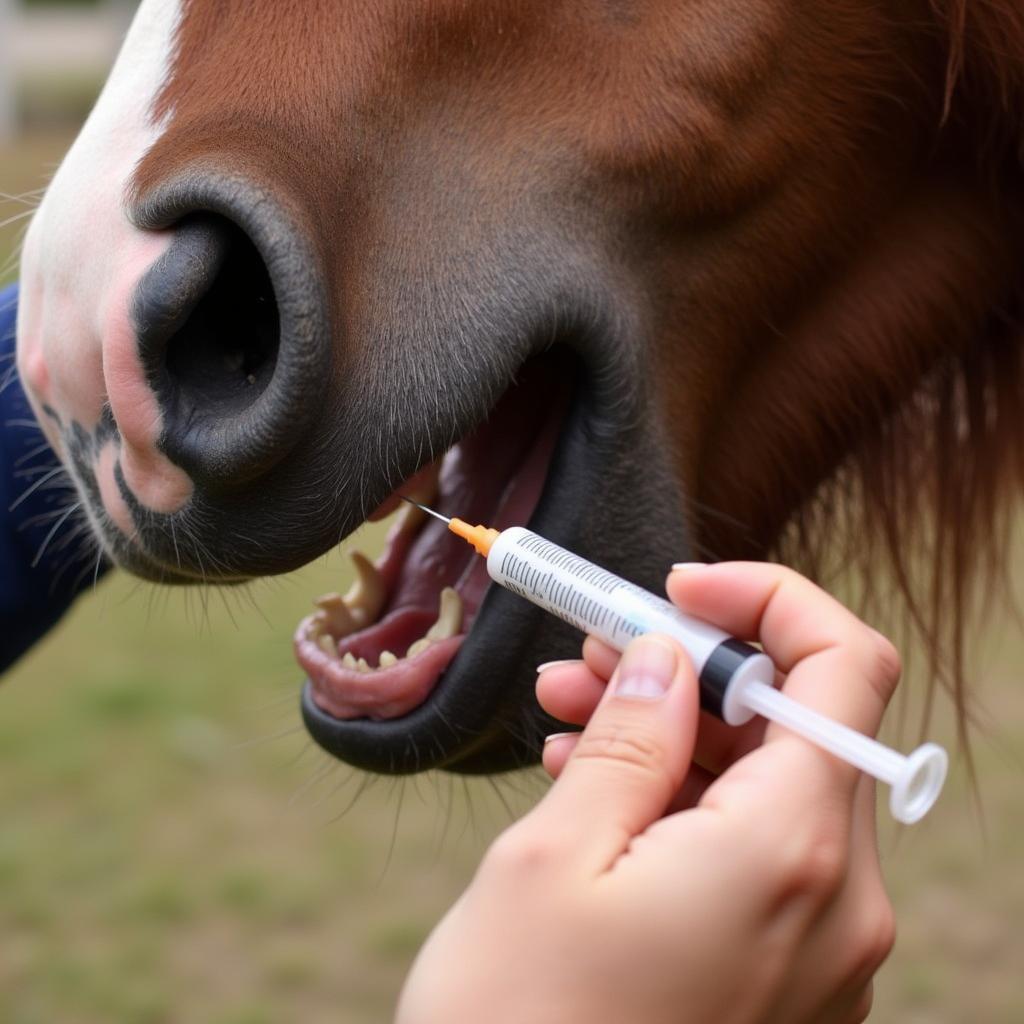Ivermectin For Ticks On Horses is a topic that requires careful consideration. While ivermectin is effective against certain internal and external parasites in horses, its efficacy against ticks is limited. This article will delve into the uses, benefits, and limitations of ivermectin for tick control in horses, empowering you to make informed decisions about your horse’s health.
Understanding Ivermectin and its Uses in Horses
Ivermectin is a broad-spectrum antiparasitic medication used to treat a variety of internal and external parasites in horses, including roundworms, lungworms, bots, and mites. It works by disrupting the nerve and muscle function of the parasites, leading to their paralysis and death.  Administering Ivermectin to a Horse However, it’s important to note that ivermectin is not a reliable method for controlling ticks on horses. While it may offer some incidental control against certain tick species, its effectiveness is not consistent enough to be considered a primary treatment.
Administering Ivermectin to a Horse However, it’s important to note that ivermectin is not a reliable method for controlling ticks on horses. While it may offer some incidental control against certain tick species, its effectiveness is not consistent enough to be considered a primary treatment.
Why Ivermectin Isn’t Ideal for Tick Control on Horses
While ivermectin is effective against many parasites, its effect on ticks is limited. It primarily targets internal parasites, and its impact on external parasites like ticks is not as potent. Certain tick species may show some susceptibility to ivermectin, but many are resistant. Relying solely on ivermectin for tick control can lead to inadequate protection and increased risk of tick-borne diseases.
Alternative Tick Control Methods for Horses
So, what are the best ways to protect your horse from ticks? Fortunately, there are several highly effective methods available:
- Topical Treatments: These include sprays, pour-ons, and spot-on treatments that contain specific acaricides (chemicals that kill ticks). They are applied directly to the horse’s skin and provide long-lasting protection.
- Tick Collars: These collars release insecticide that spreads through the horse’s coat, killing ticks on contact.
- Environmental Control: Keeping pastures mowed and removing brush and debris can help reduce tick populations.
The Importance of a Comprehensive Tick Control Program
Protecting your horse from ticks requires a multi-faceted approach. Regular grooming and inspection can help you detect and remove ticks before they transmit disease. Combining this with appropriate tick control products and environmental management strategies provides the most effective protection.
Is Ivermectin Safe for Horses with Tick Infestations?
While ivermectin might not be effective against ticks, it’s generally safe to administer to horses already infested with ticks, provided the dosage is correct and administered by a veterinarian or according to their instructions. However, using ivermectin as the sole treatment for ticks puts your horse at risk.
Expert Insights on Tick Control in Horses
Dr. Emily Carter, DVM, a renowned equine veterinarian, emphasizes, “Ivermectin is not the go-to solution for tick control in horses. Its limited efficacy against ticks makes other methods, such as topical treatments and environmental management, far superior choices.” She further adds, “Consistent tick control is crucial not only for preventing tick infestations but also for reducing the risk of tick-borne diseases, which can have serious consequences for your horse’s health.”
Another respected equine veterinarian, Dr. James Miller, DVM, adds, “Always consult with your veterinarian before using any medication on your horse, including ivermectin. They can advise you on the most effective tick control strategies based on your horse’s individual needs and your local environment.”
Conclusion
While ivermectin is a valuable medication for treating certain internal and external parasites in horses, it’s not the ideal solution for tick control. Using more effective methods like topical treatments, tick collars, and environmental control will ensure your horse stays protected from these potentially harmful parasites. Consult your veterinarian to determine the best tick control strategy for your horse.
FAQ
- Does ivermectin kill all types of ticks on horses? No, ivermectin is not reliably effective against most tick species.
- What are the signs of a tick infestation on a horse? Common signs include itching, restlessness, and visible ticks on the skin.
- Can ticks transmit diseases to horses? Yes, ticks can transmit several serious diseases to horses, including Lyme disease, Anaplasmosis, and Piroplasmosis.
- How often should I check my horse for ticks? Daily checks are recommended, especially during tick season.
- What should I do if I find a tick on my horse? Remove it promptly using tweezers, grasping it as close to the skin as possible and pulling straight upward.
- Can I use ivermectin and other tick control methods together? Consult your veterinarian before combining treatments.
- How can I prevent tick infestations in my horse’s environment? Regular mowing and removal of brush and debris can help reduce tick populations.
For further information on horse health, you might find our article on ear mites horses treatment helpful.
If you need any assistance, please contact us at Phone Number: 0772127271, Email: [email protected] or visit our address: QGM2+WX2, Vị Trung, Vị Thuỷ, Hậu Giang, Việt Nam. We have a 24/7 customer service team.